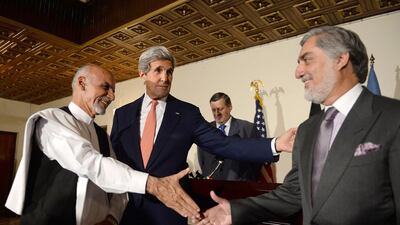KABUL // Concern is growing in Afghanistan over a US-brokered deal to resolve the disputed presidential election amid fears the crisis has done lasting damage to the country’s political landscape.
It has been more than four months since the first stage of voting was held on April 5. That was deemed relatively successful, but a subsequent run-off in June between the two leading candidates has been tarnished by allegations of rampant fraud and a bitter power struggle.
Preliminary results from the second round showed Ashraf Ghani, a former World Bank technocrat, in the lead. This caused his rival Abdullah Abdullah to temporarily withdraw from the electoral process as demonstrations erupted in Kabul. Mr Abdullah is best known as a senior member of the Northern Alliance movement that fought the Taliban regime.
Many Afghans have watched these events unfold with disillusionment and some are now beginning to wonder about the long-term consequences. American-sponsored plans for a national unity government have only added to their concerns.
The critics come from both sides of the dispute, as well those with no real affection for either candidate. A selection of them interviewed by The National spoke candidly about what they regard as a wasted opportunity for a smooth transfer of power.
Siddiq Mansoor Ansari is chairman of the Federation of Afghanistan’s Civil Societies, an umbrella organisation of more than 150 civil society groups from across the country. He accused Mr Ghani and Mr Abdullah of acting out of self-interest.
“The government should not be divided between the losing and winning candidates as we think both of them have failed,” he said.
Since the controversial preliminary results were released, US Secretary of State John Kerry has twice been to Kabul in an effort to hammer out a deal between the rival camps. His first trip in July led to an agreement that all votes from the run-off would be rechecked.
A second visit earlier this month saw Mr Ghani and Mr Abdullah confirm in writing that a national unity government will be formed, with the new position of chief executive awarded to someone from the defeated candidate’s team. Members of both camps are currently discussing the finer details of this role and other key issues.
While the compromise appears to have reduced tensions for the time being there are signs that more trouble could lie ahead.
Mr Ansari described the deal as “the last nail in the coffin of democracy in the country”, claiming that the US and the two candidates were intent on creating a system of government no one had voted for.
He said any administration that genuinely wanted to represent national unity must consist of people from civil society as well as “all the military and political opposition”.
Even the two candidates seem to disagree about what the terms of the agreement really mean. Although Mr Abdullah has described it as a form of power sharing, Mr Ghani has publicly rejected this notion.
Exactly what happens next may well depend on the outcome of the audit. The US and its allies hope the final results will be announced and a new president inaugurated before a Nato summit in Wales in early September, but there is still the prospect of further political deadlock.
Nazari Paryani runs Mandegar daily newspaper, a pro-Abdullah publication based in Kabul. He accused the incumbent Hamid Karzai and Afghanistan’s Independent Election Commission of trying to engineer a victory for Mr Ghani.
Mr Paryani said that Mr Abdullah had come close to announcing his own parallel government in July. Only a phone call from US president Barack Obama and the subsequent recount stopped him.
“This option is still on the table of Dr Abdullah. Anytime he sees that the audit of votes is political and the agreement that was signed in front of John Kerry is not being practically followed, he may use this option,” he said.
Mr Paryani predicted the audit was unlikely to change the original outcome because that would mean “trust in the election commission will have turned to dust”. He added that Mr Abdullah’s team continue to regard their candidate as the rightful winner.
Both camps rely on the backing of powerful warlords who will expect to have substantial influence in the new administration. The governor of Balkh province, Atta Mohammed Noor, has already warned he will instigate unrest if Mr Abdullah’s supporters deem the audit to have been biased.
The delay in announcing the next president has been a severe setback for the country, with the economy badly effected and a proposal to keep some foreign troops here beyond the end of the year still on hold.
Meanwhile, the Taliban have continued to gain ground in rural areas as Afghan forces struggle to cope without significant US and Nato backup.
Abdul Ghafoor Liwal is a prominent writer and political activist who supported Mr Ghani in the election. He said Mr Abdullah and other figures with Northern Alliance backgrounds had “hijacked the political process” in an effort to retain some power. He went on to predict that the formation of national unity government would tie the hands of the next president, undermining his ability to bring about positive change.
“Implementation of basic reforms and compromising — political compromising — cannot come together in one state. It’s impossible,” he said.
foreign.desk@thenational.ae

